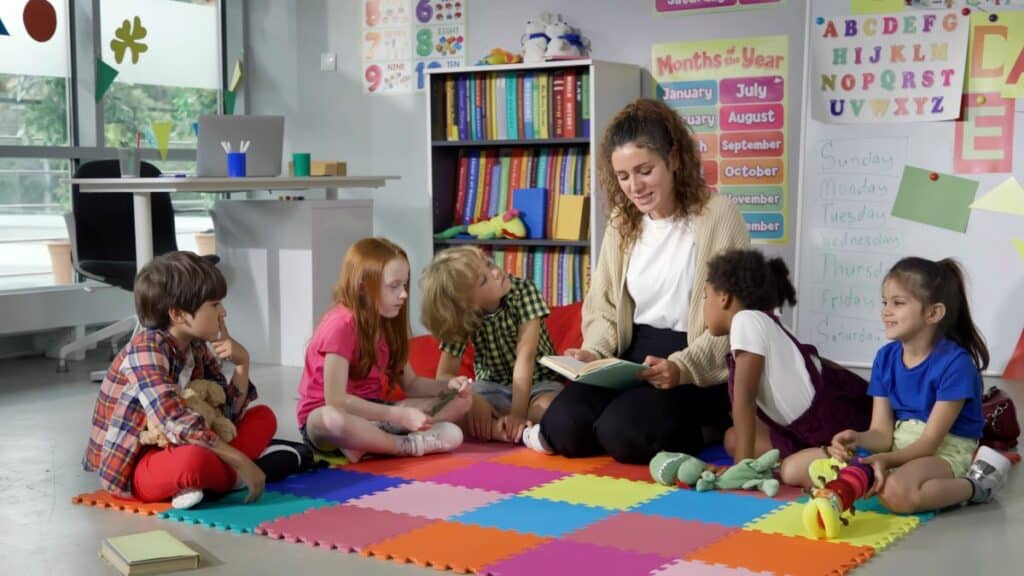Kindergarten teachers play a pivotal role in igniting a love for learning in young children. It’s a career filled with wonder, creativity, and the immense satisfaction of shaping young minds. If you’re passionate about early childhood education and dream of nurturing curious kindergarteners, here’s a roadmap to guide you on your journey:
Cultivating a Strong Foundation: The Bachelor’s Degree
Your educational journey begins with a bachelor’s degree. While some schools offer specific “Kindergarten Teacher” degrees, the most common paths are:
- Bachelor of Arts (B.A.) in Early Childhood Education (ECE): This program is specifically tailored to prepare you for working with young children, ages birth to eight. Expect in-depth coursework on child development, play-based learning, early literacy and math skills, and classroom management for young learners.
- Bachelor of Arts (B.A.) in Elementary Education: This broader program equips you to teach across elementary grades (typically K-6). You’ll gain a solid foundation in various subjects while focusing on effective teaching methods for younger students.
Nurturing Practical Skills: Teacher Preparation Programs
During your bachelor’s program, you’ll likely participate in a teacher preparation program. This program provides invaluable hands-on experience:
· Student Teaching
Immerse yourself in a kindergarten classroom for a semester, working under the guidance of a mentor teacher. You’ll plan and deliver lessons, assess student learning, and gain essential classroom management skills.
· Fieldwork
Supplement your classroom experience by volunteering or working part-time in early childhood settings like daycare centers, preschools, or after-school programs.
Earning Your Qualification: State Teaching Licensure
Each state has specific requirements for kindergarten teacher licensure. Although this can vary, generally, this involves:
· Passing Standardized Tests
These tests assess your knowledge of child development, literacy, math, and pedagogy.
· Background Check
To ensure the safety of your students, you’ll undergo a thorough background check.
· Additional Requirements
Some states may have additional coursework or portfolio requirements.
Blooming into Practice: Gaining Experience
Before landing your dream kindergarten job, consider building your experience with:
· Substitute Teaching
Gain valuable exposure to different classroom environments and age groups.
· Volunteer Work
Offer your skills and passion to early childhood programs in your community.
· Teacher’s Aide/Assistant
Assist a kindergarten teacher with daily tasks to gain further classroom experience.
Fostering Lifelong Learning
The world of education is constantly evolving. To stay ahead of the curve and ensure continuous growth in your career, consider
· Master’s Degree
Pursue a Master’s in Early Childhood Education, M. Ed. In Elementary Education, M.A. in Education or a related field to deepen your knowledge and potentially qualify for leadership positions.
· Professional Development
Participate in workshops, conferences, and online courses related to early childhood education.
· Staying Current with Curriculum Standards
Familiarize yourself with state and national curriculum standards to ensure your lessons are aligned with current learning goals.
Essential Skills for a Kindergarten Teacher
To be a successful kindergarten teacher, you need a unique blend of skills and qualities. Here are some of the most important:
Core Skills
Patience
Young children can be unpredictable, and patience is key to managing their emotions and guiding their learning.
Empathy
The ability to understand and share the feelings of others is crucial for building strong relationships with your students.
Creativity
Kindergarten teachers need to create engaging and stimulating learning experiences that spark curiosity and imagination.
Organization
Managing a classroom of young children requires excellent organizational skills.
Communication
Clear and effective communication is essential for interacting with students, parents, and colleagues.
Specific Skills
Early Childhood Development
Understanding the developmental stages of young children helps you tailor your teaching methods to their needs.
Literacy and Numeracy
A strong foundation in these subjects is essential for teaching foundational skills to young learners.
Classroom Management
Effective classroom management techniques are necessary to maintain a positive and productive learning environment.
Assessment
You’ll need to assess your students’ progress and provide appropriate feedback and support.
Differentiated Instruction
The ability to adapt your teaching strategies to meet the diverse needs of your students.
By developing these skills, you can create a nurturing and stimulating learning environment that will inspire your young students to reach their full potential.
Becoming a kindergarten teacher is a journey filled with joy, challenge, and the immense reward of shaping young minds. With dedication, passion, and continuous learning, you can create a nurturing environment where your students can blossom and thrive.
Looking for graduate-level educator content? Check out our educator’s blog and 200+ available masters, doctorates, endorsements, and certifications to advance your career today!




